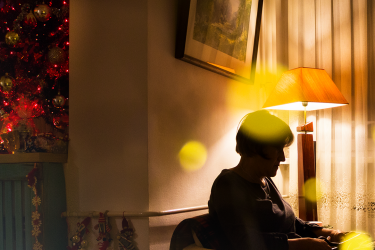Can emotional intelligence transform your professional life, especially in the high-pressure world of healthcare?
Robin Moore from Centra Human Resources joins host Cami Smith to explore this question and share her journey to becoming certified to teach emotional intelligence through TalentSmart. Listen in to learn how self-awareness, self-management, relationship management, and social awareness are essential skills for navigating today's work environment. From the value of orientation and training during transitions to sharing personal experiences of vulnerability and growth, Cami and Robin highlight the benefits of creating a safe learning space for open and honest conversations.
Speaker 1:
Hi, welcome to, and so Much More. I am your host, Cami Smith, and I'm here with my friend, Robin Moore from Human Resources, and we're going to talk about emotional intelligence today. How did you get into? So you teach a class on emotional intelligence? Yes, correct. How did you get into?
Speaker 2:
that we had talked about adding that to our curriculum for our leadership development as well as just across the organization, and so I did some research and found the training with the company called Talent Smart and was able to go and spend a few days out in San Diego.
Speaker 1:
Oh rough, I know Getting certified to teach it.
Speaker 2:
But I was really interested in it anyway, even before we started talking about offering it as a training. So when it came up at that opportunity I was very excited and very willing to volunteer to get certified to teach it.
Speaker 1:
Love it. What has the reception been like here at Centra?
Speaker 2:
It's been really great. We were a little nervous at first because it's more focused on the soft skills and people don't always put a lot of faith in the soft skills when you deal with people who deal with scientific facts and health and biology.
Speaker 1:
They're not always big fans of soft skills.
Speaker 2:
Yeah, clinical world doesn't always live in the soft skill world, and so we've been very, very pleased with the response. We get a lot of good feedback. People who come to the class. They're asking can I send people to this class? Can you come do it for our?
Speaker 1:
team. Can I send people?
Speaker 2:
We have someone who could really benefit, who could really be beneficial, but it's been very, very good and we've even been talking now with some folks within the organization about maybe the possibility of offering it to maybe some of our providers.
Speaker 1:
Oh, I love that, maybe to our residents as they're coming on board.
Speaker 2:
So it's taking root, if you will, and spreading and people are really, really excited about the possibility Okay, I joke.
Speaker 1:
It is not a negative thing to be sent to this emotional intelligence class no In fact, our entire office did it and I was so excited. I just feel like pouring into yourself, developing yourself mentally, emotionally, as a person, is so important, especially when you work with people at all. I mean it's so important in your personal life. Absolutely, and so I feel like it's such a gift to be able to go through something like this, and I also love like personality tests. I feel like I'm taking every personality test.
Speaker 1:
Oh, those are the best and so in this way, at least the way that this worked for me and please you tell me if I'm butchering this, but we got a link and we took a test, an online test, and it measured very specific things that related to emotional intelligence. Correct, what were?
Speaker 2:
those things how you deal with situations, how you're able to recognize emotions in yourself, in other people, how you can recognize the situation you're in Basically, how can you read the room, the temperature of the room and the scores when they come back? People, when they come to class, they're always a little hesitant because they're looking at me like I failed.
Speaker 1:
And I'm like it's not a. I brought mine and I'm already like kind of keeping it close.
Speaker 2:
And I always have to say it's not a test in the terms of your score determines how well or how bad you are at something. It's an indicator of how often you answered similar questions the same way. Yeah, because I know when people take it they're looking at me like you asked the same question multiple times and there's a method to that method?
Speaker 1:
Yes, there is.
Speaker 2:
And it's the great thing about the emotional intelligence assessment that you take is it tells you where you're at right now. Yeah, the great thing about the emotional intelligence assessment that you take is it tells you where you're at right now, yeah. And then once you've taken the class, you get lots of great resources available to you to work on improving areas where you want to improve. It is the one part of our personality or our makeup that we can improve.
Speaker 2:
Yeah, we can't change our IQ, because it is what it is. It is what it is, it's our capacity to learn, and our personality doesn't tend to change. We basically are who we are. We can adapt, we can adjust to situations as needed, but our emotional intelligence is the one factor that we can improve. We can get better at with practice, with purposeful practice, and so that's the great thing about the class is, once you take the class, six months later you get another assessment link to take the assessment again.
Speaker 2:
Yes, that was quite insightful To see areas where you may have improved from your first time, and it's just that knowledge about yourself, about social situations and how you deal with those. It's invaluable, especially in the world that we live in in health care, because you are dealing with so many different types of people and so many different types of emotions at various times. It's really good to have that level of self-awareness, to be able to say this is a good day for me, or it's a bad day for me, or I know what I need to do to adjust.
Speaker 1:
Yes, there is such I don't want to call it a trend, even though that's what it kind of feels like there is a higher awareness and a higher importance really placed on like mental health and emotional health within just kind of communities Ours, a growing one but you know, I feel like if you go online, like you can't be online and not see something about self-awareness, and so you know what this has done like for me personally.
Speaker 1:
So identified self-awareness is one of my highest scores, which is awesome, yeah, but self-management was my lowest score, so I'm very aware, but I don't do anything with it. But that was so helpful for me to take a step back and take a look at myself realistically and some of the resources I went through, some of the resources that were provided and it did it really raised that score for me, which was so interesting to see six months later that there was an impact here, and so, when I think about this, for those who are watching this, who maybe don't work at Centra and they don't have this as a resource, necessarily, from what you've learned from this, what knowledge would you impart for the general public as it relates to the importance of emotional intelligence?
Speaker 2:
I think the main thing is the self-awareness piece. So many people can benefit from that. Some people think they're self-aware and they really aren't. So I would highly encourage people, if you have a chance, to follow the Talent Smart page on Facebook or LinkedIn or read the book Emotional Intelligence. It's a huge, it's a huge win. It's a great way to sort of invest in yourself, pour into yourself. I think ever since COVID, as we were talking about earlier, we've all had to make changes. We've all had to readjust how we approach just our everyday life and just having that knowledge about yourself what triggers you, what makes you happy, what makes you sad, what angers you to be able to know and realize, oh, this is going down the wrong road or this is going to be a good day and I can help it. Just that's the very first step, that self-awareness level and it's interesting, self-awareness was also my highest.
Speaker 1:
Was it really?
Speaker 2:
I love it and self-management was my lowest. Maybe that's pretty common, I don't know, it might be, but I would think definitely. Yeah, the self-awareness is really the key.
Speaker 1:
And so if somebody's watching you started.
Speaker 2:
It gives you that baseline and it includes a link that folks who buy the book they can actually take the assessment online as well.
Speaker 1:
So there you go Opportunity to actually be a part of it Absolutely, and then getting. This is the six months later that included if you take the initial test. Is that just part of it? Or that may be what Centra does.
Speaker 2:
That's what Centra, that's what I was being with me being a certified trainer, we're able to do that, but it is with the book. You can. You know for yourself or a loved one can take that just to give you that baseline of this is where I'm at. But then the book also walks you through ways to improve areas where you want to get better, how you can, different steps you can take, things you can do on a daily basis, practices you can put in place to help you, and it becomes part of. If it becomes part of your daily routine, you start building new neural pathways and your brain literally starts to change. The more you practice it, the more you do it. Yeah, it does, and then it becomes part of your everyday behavior.
Speaker 1:
Oh my gosh, I love it. So I follow a neuroscientist. Her name is Dr Caroline Leaf. I'm not sure if you've heard of her, but she talks a lot about. She calls them creating grooves in your brain and rewriting habits and thought patterns.
Speaker 1:
And it aligns so closely now that you say that with so much of this work, because I think there is that mindset that people have, that like people just don't change you know, what I mean and on some level you are who you are Correct but how you interact with other people, and I think even the more you understand yourself, it really opens you up to understand the people around you a little bit better and it can be a drastic difference from point A to maybe point Z, but you know, time there's a difference that can be made.
Speaker 1:
I love that you talked about that time in COVID, because I think a big part of this, even for me and like developing emotional intelligence, came in that COVID season because I was alone. So many people are never alone and and when you are alone and quiet for prolonged periods of time, um, you start to ask those questions that you really just mentioned before, like how do I feel about this? You know, why am I angry? Yes, like questions, it's almost like the things that you do go and talk to a therapist, like I love my therapist, go to therapy. It's amazing. But asking those questions of yourself before you even get to the point where you can talk about that with someone else, I think is so important. A huge part about being self-aware, yeah. And then you work on the self-management Self-management piece, yes, which is a journey, yes, it is.
Speaker 2:
But then the relationship management is also part of the emotional intelligence how you relate to other people, how you manage your emotions, how you react to and recognize their emotions. And I think we missed that piece in COVID because we were alone and so now it's having to. After COVID it was readjusting to be back in office settings or being around people where you're used to doing your own thing, and now you have to readjust. And so it's another big part of the emotional intelligence piece how do I manage this relationship? But also the social awareness when I'm back in a crowd of people or in an office setting to be able to read the room and understand if somebody's having a bad day, if somebody's, you know, struggling, can I help if I'm struggling, and it's just all blends together so beautifully when it all comes together.
Speaker 1:
It really does. I think specifically so with your role in HR, and you do a lot of the orientation, you do all the orientation.
Speaker 2:
All the orientation, yes.
Speaker 1:
And so having something like this available when you're switching roles whether you're switching roles within an organization or if you're transitioning into a completely new organization I think this could be so vital because you know you carry along beliefs or even behaviors and things that maybe weren't OK but you were led to believe they were. But you bring all that baggage into your new place, and having something like this to help you pull that apart and really label some things I think is invaluable. So thank you so much for the work that you do.
Speaker 1:
Oh, you're welcome, it was wonderful to go through the class we were talking earlier and our whole team went through this class last year, I believe it was and so we all did the tests and got all of the I don't know what would you call all this. It was like a whole packet.
Speaker 2:
There was a book and there was this.
Speaker 1:
But then I didn't get to go through the class with my team because I think I was on PTO or something and so I got to go through with some strangers. I was on PTO or something and so I got to go through with some strangers, but it was very cool because we were all in very different positions around the hospital and I learned so much about really even Centra, like I learned so much about these caregivers that I don't work with on a daily basis, who do very different work than I do, whether it be clinical or IT or you know all of the things and so it was very cool. It kind of brought some walls down, because it's very vulnerable to talk about yourself, but when you're doing in the safe space that you've created in this class, where that's what you're coming to do, it almost takes the heat off of the fact that you're sharing about yourself because, we're here.
Speaker 1:
We're there to do that. Um so yeah, it was very cool. Have you enjoyed teaching the class? I mean, it was a blast.
Speaker 2:
It is one of my favorite things that I teach. Um, it really is, because it is so foundational and it's to see people go oh, you see that aha moment. But it is, and that's one of the things in class that we stress. Lean into your discomfort and be open and honest and candid, because we're all here for each other and this is a safe space so you can talk about what's bothering you and I always tell I always encourage my classes too. If you don't buy into it, let me know, push back on me, we'll have that conversation.
Speaker 1:
So have you had many people?
Speaker 2:
I really like what is this? I really haven't. They'll come in with that sort of attitude Like why am I here and what is this and the soft skill stuff, but then by the end of the class, they're, they're believers.
Speaker 1:
They're like oh wow, I didn't think about that. All of a sudden they're following you on Facebook.
Speaker 2:
Yeah, they're like connect, LinkedIn connect, and I'm like sure I love it. But, yeah, so it is. It's one of my favorite things that we offer to the organization, and so my hope going forward is that we're going to open it up to even more caregivers across the organization because it is such a valuable training and such a valuable knowledge to be able to take with you into your role, whatever it might be.
Speaker 1:
Yeah Well, it was extremely valuable to me, so thank you so much Glad you enjoyed it.
Speaker 1:
And those of you who are watching. If you haven't taken this class or if you don't work in center, you don't have access to this class. Like she said, talent, smart, eq. Go find them on Instagram, go find them on Facebook. There are some just great. I call them nuggets so great nuggets that are so applicable. And then the book. If you get the book, there is a quote in there for you to go ahead and take the test. So, robin, thank you so much for coming on.
Speaker 2:
Absolutely. Thank you for having me. I enjoyed talking about it Awesome.
Speaker 1:
And thank you guys for joining us on and so Much More.




